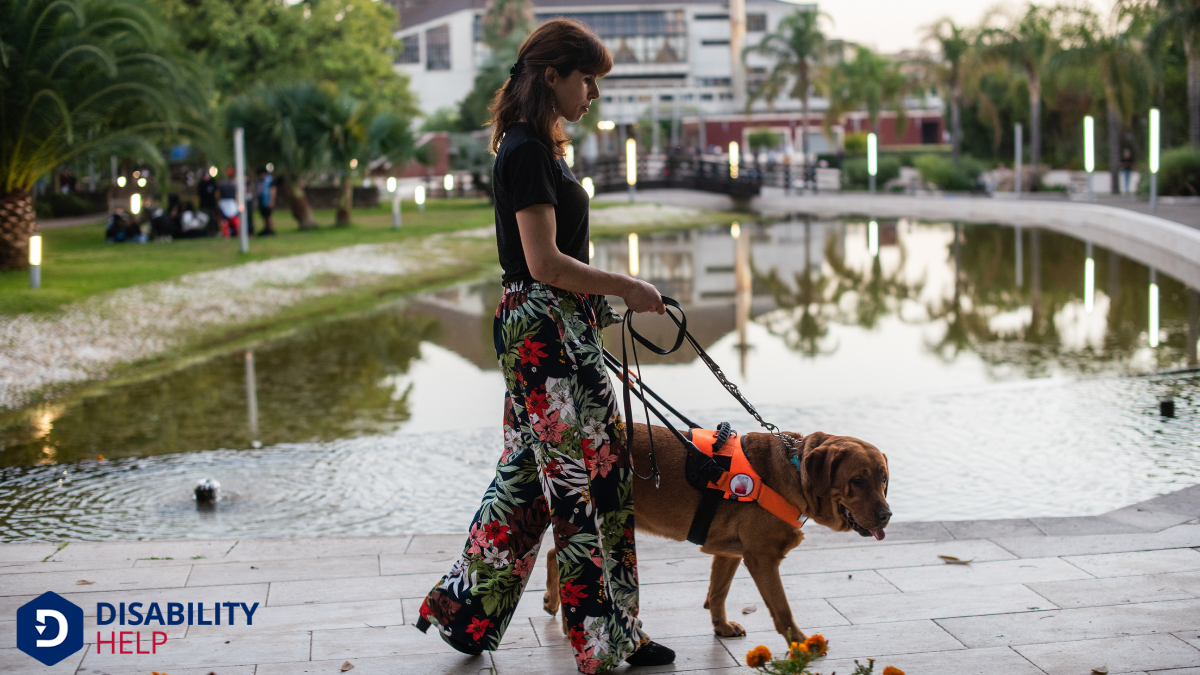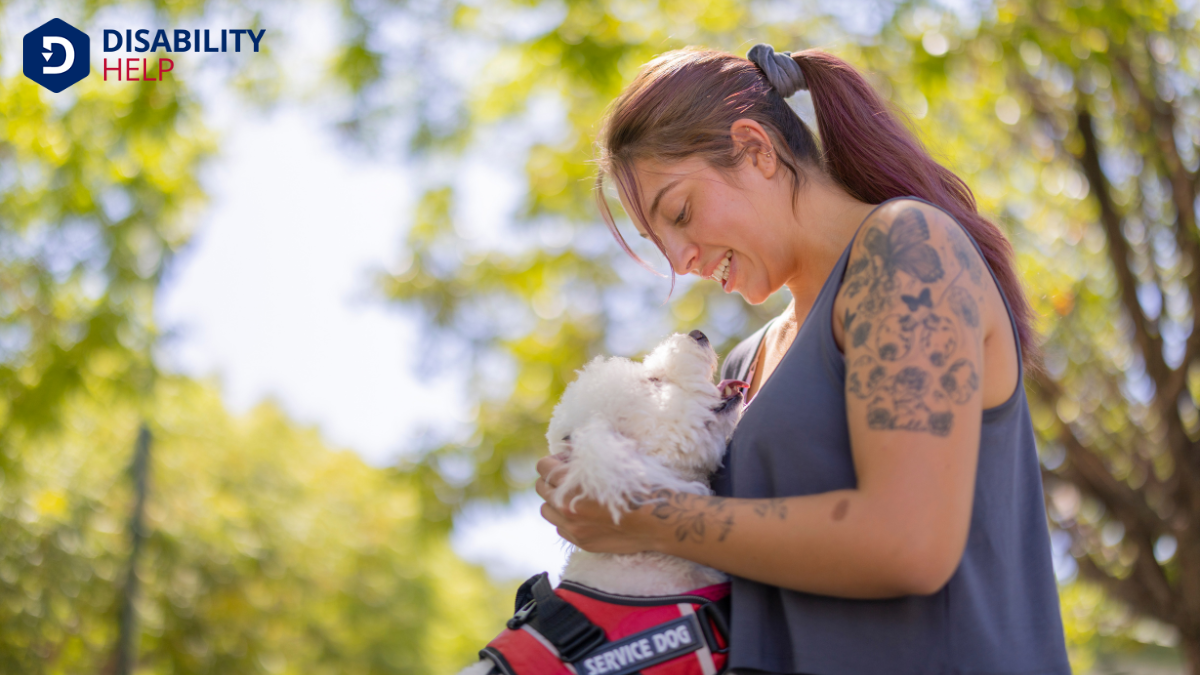Let's explore whether service animals are protected under disability laws. We often hear about the rights of those with disabilities, but what specific protections extend to their service animals? These animals aren't just pets; they're crucial companions, performing essential tasks. But how do laws like the ADA guarantee their rights? And what obligations do businesses have? Understanding these nuances can foster a more inclusive society, but there's more to uncover.
Key Takeaways
- Service animals are protected under the Americans with Disabilities Act (ADA)A U.S. law that prohibits discrimination against individuals with disabilities in all areas of publi..., ensuring public access rights for individuals with disabilities.
- The Fair Housing Act (FHA)A U.S. law that prohibits discrimination in housing based on disability, race, color, religion, sex,... allows service animals in housing, even where no-pet policies exist.
- Under the Air Carrier Access Act (ACAA), airlines must accommodate service animals during travel without additional fees.
- Businesses cannot require documentation or charge extra fees for service animals, ensuring non-discriminatory access.
- Only dogs are recognized as service animals under the ADA; emotional support animals have different legal protections.
Understanding the Definition of a Service Animal
When we talk about service animals, it’s essential to know exactly what they are and how they differ from pets or emotional support animals.
Service animals are specifically trained to perform tasks for individuals with disabilities. These tasks are directly related to the person's disability. For instance, a guide dog helps someone with visual impairments navigate safely, while other service animals might alert deaf individuals to sounds or assist with mobility.
Unlike pets or emotional support animals, service animals have a defined role that enhances the independence and safety of their handlers. We should remember that their training and tasks make them important for the well-being of many.
Understanding these distinctions helps us appreciate the significant support service animals provide.
Key Disability Laws Protecting Service Animals

As we explore key disability laws, we find that the Americans with Disabilities Act (ADA) provides a clear definition of service animals, ensuring their right to accompany individuals in most public spaces.
The Fair Housing Act extends these protections to housing situations, allowing service animals to live with their handlers without discrimination.
Additionally, the Air Carrier Access Act safeguards our ability to travel with service animals on airplanes, ensuring they can assist us wherever we go.
ADA Service Animal Definition
Since understanding the legal framework is vital for the rights of individuals with disabilities, let's explore how the Americans with Disabilities Act (ADA) defines service animals.
According to the ADA, service animals are dogs specifically trained to perform tasks for individuals with disabilities. These tasks must directly relate to the person's disability. For example, a guide dog might assist someone with visual impairments, while another dog could alert a person with diabetesA chronic condition where the body cannot produce or properly use insulin, leading to high blood sug... to a drop in blood sugar.
It's important to highlight that emotional support animals, therapy animals, or other species aren’t recognized as service animals under the ADA.
Fair Housing Act Protections
Although the Fair Housing Act (FHA) primarily addresses housing discrimination, it also plays an important role in protecting the rights of individuals with disabilities who require service animals.
Under the FHA, housing providers must make reasonable accommodationsModifications or adjustments in healthcare settings to support patients with disabilities. for people with disabilities, allowing service animals even in properties with a no-pets policy. This means we can live with our service animals, provided they assist us with a disability-related need.
The FHA requires documentation if our disability and need for a service animalAn animal that is trained to perform tasks for the benefit of a person with a disability, protected ... aren’t apparent. However, providers can’t ask for details about our disability.
It’s vital that we guarantee our request aligns with FHA guidelines to avoid unnecessary challenges. Understanding these rights helps us secure a living environment that supports our needs and well-being.
Air Carrier Access Act
While the Fair Housing Act guarantees we can live with our service animals, the Air Carrier Access Act (ACAA) secures our ability to travel with them.
The ACAA guarantees airlines can't refuse us and our service animals passage on flights. It prohibits discrimination and mandates accommodations, allowing us to navigate air travel with less hassle.
We must notify airlines about our service animals in advance, and there might be specific paperwork required. This law covers service dogs but doesn't extend to emotional support animals, as rules for them have changed.
Understanding these requirements helps us prepare for travel and guarantees a smoother experience. By knowing our rights, we can confidently advocate for ourselves and our service animals in the skies.
Rights of Individuals With Disabilities Using Service Animals
Understanding the rights of individuals with disabilities who use service animals is essential for guaranteeing accessibilityThe design of products, devices, services, or environments to be usable by people with disabilities.... and equality. We must recognize that these rights are protected under laws like the Americans with Disabilities Act (ADA). This legislation guarantees that people with disabilities can bring their service animals to most public places, including restaurants, hotels, and public transportation, without facing discrimination.
Service animals aren't pets but working animals trained to perform specific tasks that mitigate their handler’s disability. By acknowledging this distinction, we help foster an inclusive environment.
It’s important for everyone to respect these rights and understand that asking for documentation or charging extra fees for service animals isn't allowed. Let’s embrace our role in supporting access and acceptance for all.
Obligations of Businesses and Public Entities
Having explored the rights of individuals with disabilities using service animals, we now focus on what businesses and public entities must do to comply with these laws.
First, we must allow access for service animals wherever the public is permitted. It's essential that we don't isolate or treat individuals with service animals differently.
We can only ask two questions: Is the animal required due to a disability? What tasks is it trained to perform? We shouldn't request documentation or make assumptions about disabilities.
Additionally, we must guarantee that our spaces are accommodating and safe for service animals. If any issues arise, like the animal being disruptive or out of control, we can ask them to leave, but otherwise, full access should be granted.
Differences Between Service Animals and Emotional Support Animals

When discussing the differences between service animals and emotional support animals, it’s essential to understand their distinct roles and legal protections.
Service animals, typically dogs, are specially trained to perform tasks for individuals with disabilities, like guiding the visually impaired or alerting those with hearing issues. Under the Americans with Disabilities Act (ADA), they’re allowed in most public places.
Emotional support animals (ESAs), however, provide comfort through companionship and don’t require specialized training. They aren’t covered by the ADA, meaning they don’t have the same access rights to public spaces as service animals.
While ESAs can be important for mental health, their legal protections are limited mainly to housing under the Fair Housing Act.
Knowing these differences helps us respect both roles appropriately.
Navigating Challenges and Misconceptions
Let's explore how we can overcome accessibility obstacles and clear up common myths about service animals.
Together, we'll address misunderstandings that can create barriers for those who rely on these essential companions.
Overcoming Accessibility Obstacles
Though service animals play a vital role in enhancing the independence of individuals with disabilities, misconceptions and accessibility challenges persist.
We often encounter barriers when trying to access public spaces with our service animals. It's essential for us all to understand the legal rights of those who rely on these animals. Ensuring compliance with the Americans with Disabilities Act (ADA) can help us eliminate unnecessary obstacles.
When we face resistance, it's often due to a lack of awareness or misunderstanding. By educating businesses and the public, we can foster a more inclusive environment.
Let's work together to advocate for clear signage, staff training, and open dialogue. These steps will create a smoother path for individuals who depend on their service animals daily.
Debunking Common Myths
How often do we encounter myths about service animals that perpetuate misunderstandings? We’ve all heard them: service animals are only for the blind, or they need special vests to be recognized.
These misconceptions create barriers for those who rely on them. Let’s clarify: service animals assist people with various disabilities, not just visual impairments. They can help with physical, sensory, psychiatric, intellectual, or other mental disabilities.
Another myth is that service animals require official certification. In truth, no legal certification is necessary; training tailored to the handler's needs is what counts.
Frequently Asked Questions
Can Service Animals Be Any Breed of Dog?
Yes, service animals can be any breed of dog. We ought to focus on the dog's ability to perform tasks for the handler. Let's make certain we comprehend their role rather than judging them by breed stereotypes.
Are Service Animals Allowed in Swimming Pools?
We can't take service animals into swimming pools due to health regulations. However, they're typically allowed on the pool deck or nearby areas. It's important to respect these rules while ensuring our needs and rights are met.
How Do Airlines Accommodate Service Animals on Flights?
Airlines accommodate service animals by allowing them to stay with us in the cabin, usually at no extra charge. We should contact the airline ahead of time to understand their specific policies and guarantee a smooth journey.
Can Service Animals Be Owner-Trained?
Yes, service animals can be owner-trained. We shouldn't overlook this option because it allows more flexibility in addressing specific needs. It's essential that we grasp the training demands and commitment required to guarantee effective assistance and behavior.
What Documentation Is Required for a Service Animal?
We don't need specific documentation for a service animal. Instead, we must be prepared to explain the tasks our service animal performs related to our disability. Businesses can only ask if it's for a disability and what tasks it performs.
Conclusion
In summary, we must recognize the vital role that service animals play in enhancing the lives of individuals with disabilities. Protected under the ADA, these trained companions guarantee greater inclusivity and accessibility. It's essential for all of us—businesses, public entities, and individuals—to understand and respect the rights granted to service animals and their handlers. By doing so, we're fostering a more inclusive society and challenging misconceptions that can lead to unnecessary hurdles for those relying on these indispensable partners.






